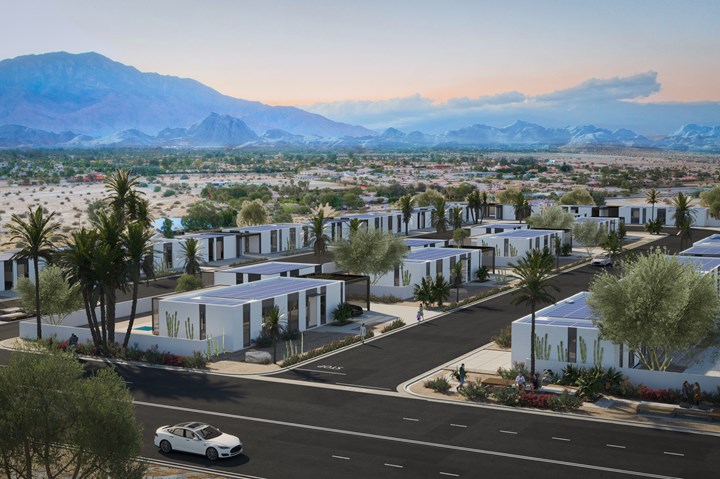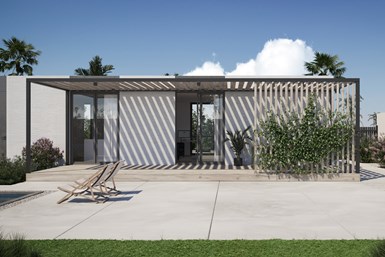Palari Group, Mighty Buildings to develop community of 3D-printed, zero-net energy homes
Palari to construct 15 eco-friendly homes via 3D-printed panelized Mighty Kit system, which delivers prefabricated polymer composite panels for reduced waste and setup time.

Rancho Mirage. All photo credit: Mighty Buildings
It was announced on March 10 that Palari Group (Rancho Mirage, Calif., U.S.), a development company dedicated to re-imagining real estate through innovative and sustainable building strategies, and Mighty Buildings Inc. (Oakland, Calif., U.S.), a startup construction tech company that creates homes using large-format 3D printing, advanced materials and automation (see “3D-printed prefab homes aim to disrupt construction market”), have secured a site and commenced development of what the companies say will be the world’s first community of 3D-printed, zero-net energy homes located in Rancho Mirage, California.
Palari plans to develop the five-acre parcel into a planned community of 15 eco-friendly homes, built using the 3D-printed panelized Mighty Kit system by Mighty Buildings. Palari says the $15 million sustainable development is centered around integration of technology and sustainability, from the 3D-printing production process which eliminates 99% of construction waste, to the efficiency of operations with solar energy and weather-resistant materials, to the efficiency of the homes themselves. Rancho Mirage itself is said to be the forefront of sustainability in Coachella Valley.
“We could not be more excited for this groundbreaking collaboration with Palari, and to be a part of the creation of the world’s first 3D-printed zero net energy community,” says Alexey Dubov, co-founder and COO of Mighty Buildings. “This will be the first on-the-ground actualization of our vision for the future of housing — able to be deployed rapidly, affordably, sustainably and able to augment surrounding communities with a positive dynamic.”

Mighty Cinco buildings.
Featuring textured exterior stone walls and floor-to-ceiling windows, each property will complement its natural surroundings with mid-century modern architecture and will consist of a primary residence of 1,450 square feet, comprising three bedrooms, two baths and a secondary residence of 700 square feet comprising two bedrooms and one bath. Situated on a 10,000-square-foot lot, each backyard will feature a swimming pool with deck and views of the surrounding mountains. Homes will integrate DARWIN by Delos, a state-of-the-art wellness intelligence solution to help enhance human health and well-being via localized water filtration and circadian lighting. All energy needs will be supplied by solar, with optional Tesla Powerwall batteries and EV chargers for a fully integrated electric car-home experience. Other upgrade options include backyard amenities such as pergola decking, cabanas, hot tubs, firepits and outdoor showers.
“We are thrilled to launch this first development of 3D-printed sustainable homes and partner with Mighty Buildings to realize our common vision of transforming the way we build homes of the future,” says Basil Starr, founder and CEO of Palari. “3D printing allows us to build faster, stronger and more efficiently, making it integral to our platform of streamlining home-building process centered on sustainability of construction, materials and operations.”
Palari is planning to build communities of sustainable healthy smart single-family homes in suburban locations across California, introducing a new era of homebuilding. During the presale stage, prices start at $595,000 for a base 3BR/2BA model and go up to $950,000 for a two-home configuration with upgrades.
Related Content
-
Toray rCF from Boeing 787 is incorporated into ultra-light laptops
Torayca-based aerospace components have successfully been repurposed into the Lenovo ThinkPad X1 Carbon Gen 12, highlighting the ongoing application of recycled composites.
-
Composites end markets: Electronics (2024)
Increasingly, prototype and production-ready smart devices featuring thermoplastic composite cases and other components provide lightweight, optimized sustainable alternatives to metal.
-
Running shoe insoles get a lift with thermoplastic fiberglass tapes
FlexSpring insoles take advantage of unidirectional, continuous fiberglass and thermoplastics to enable next-level performance for the everyday runner.















